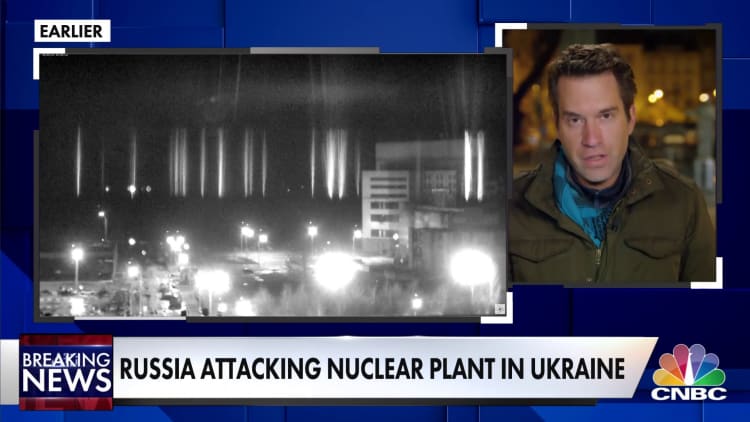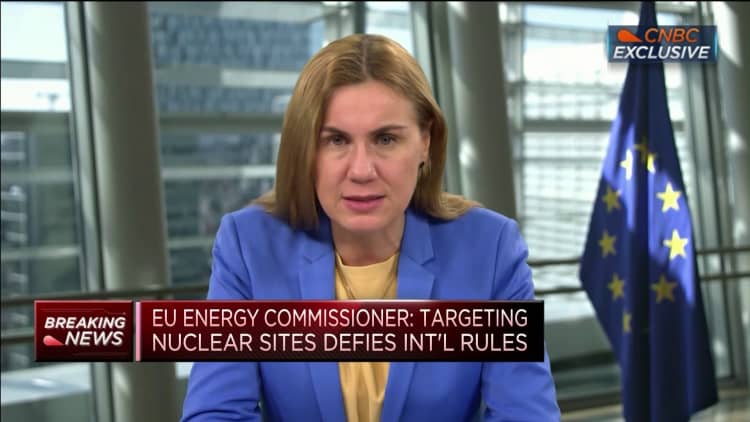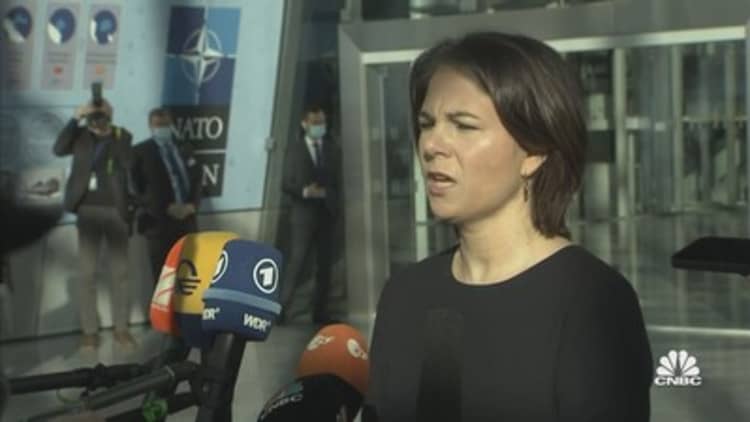Russian shelling of Europe's largest nuclear power plant on Friday prompted widespread dismay, with world leaders swiftly condemning the assault and the U.N. nuclear chief warning "we are in completely uncharted waters."
Russian military forces have seized control of Ukraine's Zaporizhzhya nuclear power plant, according to Ukraine's nuclear agency, following a night of shelling that set a building ablaze at the complex.
Authorities say the fire at the site has now been extinguished by emergency services and radiation levels are normal. Two security personnel were injured as a result of the attack.
In response, Ukraine's President Volodymyr Zelenskyy said: "Europe needs to wake up."
"We are issuing a warning, no country has ever shot at nuclear blocks except for Russia," Zelenskyy said in a video statement, according to a translation. "For the first time ever in our history, in the history of humankind, the terrorist country has reverted to nuclear terror."

Situated in the southeast of Ukraine, the Zaporizhzhya complex houses six of the country's 15 operational nuclear power reactors.
These reactors produce about half of the country's electricity.
Reactors not affected
The U.N. nuclear chief said on Friday that it was understood the projectile that hit Zaporizhzhya came from Russian forces.
Rafael Mariano Grossi, director-general of the International Atomic Energy Agency, warned the situation at the complex is "very fragile" and "continues to be extremely tense and challenging."
"It is important to say that all the safety systems of the six reactors at the plant were not affected and that there has been no release of radioactive material," Grossi said.
Both Russia and Ukraine are considering an offer of meeting at Chornobyl, he added: "It is time for action ... we need to do something about this." The aim of the proposed meeting was for both sides to recommit to the principles of nuclear safety.
The State Nuclear Regulatory Inspectorate of Ukraine said personnel at the Zaporizhzhia facility were monitoring the condition of power units to ensure they could operate safely.
It comes as Russia's invasion of Ukraine enters its ninth day and amid conflicting reports about which side controls the strategically important Black Sea port city of Kherson.
Global condemnation
World leaders condemned Russia's attack on the Zaporizhzhya nuclear power plant.
U.K. Prime Minister Boris Johnson said the "reckless actions" of Russian President Vladimir Putin could "directly threaten the safety of all of Europe."
U.S. President Joe Biden urged Moscow to stop its military activities around the site, while Canada's Justin Trudeau said the "horrific attacks" at the nuclear site were unacceptable and called on Russia to "cease immediately." All three heads of government spoke to Ukraine's President Volodymyr Zelenskyy by telephone.
The IAEA has put its Incident and Emergency Centre in "full response mode" due to the situation at the nuclear site and appealed for a halt of the use of force.
The U.N. agency had previously warned Russia's war with Ukraine had raised the risk of nuclear accidents and called for restraint from all actions that could jeopardize the safe operations of Ukraine's nuclear facilities.

The European Union's top diplomat Josep Borrell said that the shelling and resulting fire at the plant could "endanger the whole of Europe." He said he supported a call for an emergency meeting of the U.N. Security Council to discuss the attack.
"Russian attacks in the direct vicinity of Ukraine's nuclear power plants can have catastrophic consequences. They must stop immediately," Borrell said via Twitter.
Ukraine's Zelenskyy on Friday issued another appeal to European leaders, calling on their support after a night of intense fighting.
Meanwhile, Ukraine Foreign Minister Dmytro Kuleba said via Twitter on Friday that Russian military forces had been "firing on all sides" at the Zaporizhzhya nuclear power plant. He warned: "If it blows up, it will be 10 times larger than Chornobyl! Russians must IMMEDIATELY cease the fire, allow firefighters, establish a security zone!"
An explosion and fire at the Chornobyl power plant on April 26, 1986, led to the world's worst nuclear disaster. Russian troops took control of the area around the defunct power plant last week.
Estimates of the numbers of direct and indirect casualties from the Chornobyl disaster vary, although environmental group Greenpeace puts the eventual death toll from cancers caused by Chornobyl at close to 100,000.
The Chornobyl exclusion zone, a vast and empty land of roughly 1,000 square miles around the shuttered reactor disaster, lies between the capital city of Kyiv and the Belarus-Ukraine border.



